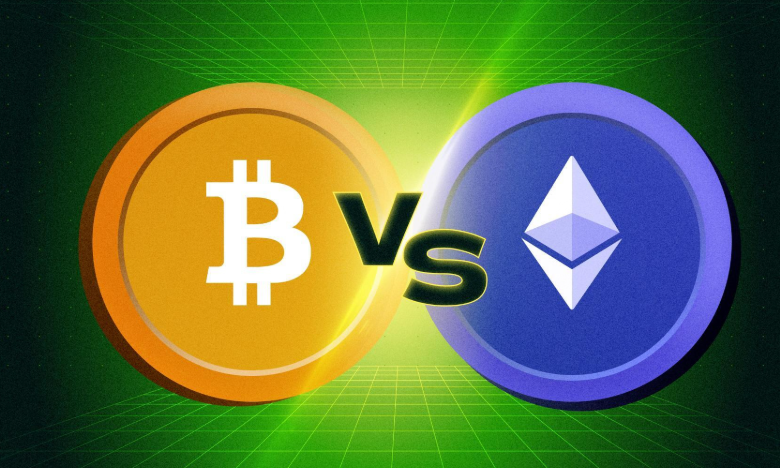Ethereum Price vs. Bitcoin Price: Which One Is the Better Investment?

In the world of cryptocurrencies, two names stand out: Ethereum and Bitcoin. Both have made their mark as dominant players in the digital currency market, but when it comes to making an investment decision, the choice between Ethereum Price and Bitcoin price can be a bit challenging. In this article, we will explore the key differences between Ethereum and Bitcoin, their price trends, and factors that could influence their future performance to help you determine which one is the better investment.
Understanding Bitcoin and Ethereum
Bitcoin, created by the pseudonymous Satoshi Nakamoto in 2008, was the first-ever cryptocurrency. Its primary purpose was to serve as a decentralized digital currency that could be used as a store of value, much like gold. Over time, Bitcoin has become widely recognized as the “digital gold” of the crypto world. With its limited supply of 21 million coins, Bitcoin is often seen as a hedge against inflation. As a result, tracking the real-time value conversion of Bitcoinand other cryptocurrency like sats to USD has become a common practice for many crypto enthusiasts.
Ethereum, on the other hand, was introduced by Vitalik Buterin in 2015. While Ethereum also operates as a cryptocurrency, its functionality extends beyond that. Ethereum’s blockchain allows for the creation of decentralized applications (DApps) and smart contracts, making it more than just a digital currency. The native cryptocurrency of the Ethereum network is called Ether (ETH), and its price movements are influenced by both the demand for the currency and the overall adoption of Ethereum’s network.
Price Comparison: Ethereum vs. Bitcoin
To make an informed decision, it’s essential to compare the Ethereum price against the Bitcoin price in terms of both historical performance and current market trends.
Historical Performance
Bitcoin’s price history has been marked by periods of explosive growth, followed by significant corrections. It first gained attention in 2017 when it surged past $20,000 per coin before crashing down to around $3,000 in early 2018. However, Bitcoin has shown resilience, consistently recovering and reaching new all-time highs, with a peak of around $68,000 in 2021.
Ethereum, though it started with a lower price point, has demonstrated remarkable growth since its inception. From a modest $1 price tag in 2015, Ethereum’s price surged to over $4,000 in 2021. Ethereum’s growth trajectory is not just tied to speculation, but also to the increasing adoption of its blockchain for various applications, including decentralized finance (DeFi) and non-fungible tokens (NFTs).
Current Market Trends
As of mid-2025, Bitcoin’s price is hovering around $35,000, while Ethereum is priced at approximately $2,000. While Bitcoin remains the more valuable cryptocurrency in terms of price per coin, Ethereum has a higher total circulating supply, which impacts its price-to-market cap ratio.
The key difference between Ethereum price and Bitcoin price is their volatility. Bitcoin’s price often experiences large fluctuations, but it has shown a more predictable pattern of growth over time. Ethereum, while also volatile, tends to be influenced more by the development of the Ethereum network and innovations within the DeFi space.
Factors Influencing Ethereum Price and Bitcoin Price
- Market Adoption and Use Cases
- Bitcoin: Bitcoin’s primary use case is as a store of value and a medium of exchange. It has a more extensive market adoption as a digital currency, especially in countries with economic instability. However, its scalability issues and high transaction fees limit its everyday use.
- Ethereum: Ethereum’s network is widely used for decentralized finance (DeFi) applications, smart contracts, and NFTs. The increasing adoption of Ethereum for these use cases has significantly impacted the Ethereum price, as more people use ETH to interact with the network.
- Technological Developments
- Bitcoin: Bitcoin’s development has been slow compared to Ethereum, as the community tends to prioritize stability and security. While Bitcoin’s lightning network aims to improve scalability, it still faces challenges in becoming a widespread method for daily transactions.
- Ethereum: Ethereum has seen significant upgrades over the years, with the transition to Ethereum 2.0 focusing on solving scalability and energy efficiency issues. Ethereum 2.0’s shift to proof-of-stake (PoS) promises lower energy consumption and faster transaction processing times, which could drive demand for ETH and positively influence the Ethereum price.
- Supply and Demand
- Bitcoin: The supply of Bitcoin is capped at 21 million coins, creating scarcity. This scarcity is one reason why many investors view Bitcoin as a store of value and a potential hedge against inflation.
- Ethereum: Unlike Bitcoin, Ethereum doesn’t have a capped supply. However, Ethereum’s ongoing upgrade to Ethereum 2.0 and the introduction of EIP-1559 (a burn mechanism) have resulted in reduced inflation rates for ETH, with some even suggesting that ETH could become deflationary over time.
Which Is the Better Investment?
When choosing between Ethereum price and Bitcoin price as an investment, it’s important to consider your investment goals and risk tolerance.
- Bitcoin: Bitcoin is often seen as a more stable investment relative to other cryptocurrencies due to its established position in the market and its widespread adoption as a store of value. If you’re looking for a long-term investment that is viewed as a hedge against inflation and market uncertainty, Bitcoin might be the better option.
- Ethereum: If you’re looking for a cryptocurrency with a higher potential for growth, particularly in the fields of decentralized finance and blockchain technology, Ethereum might be a more promising investment. The increasing adoption of Ethereum’s platform for smart contracts, NFTs, and DeFi applications has the potential to drive up demand for ETH, making it a more dynamic investment option.
Final Thoughts
Both Bitcoin and Ethereum have their unique advantages and challenges. While Bitcoin has a higher market cap and is considered a store of value, Ethereum’s robust ecosystem of decentralized applications and continuous development makes it an attractive choice for investors interested in the evolving world of blockchain technology.
Ultimately, the better investment between Ethereum price and Bitcoin price depends on your risk appetite and investment strategy. For those seeking stability and long-term value preservation, Bitcoin remains a solid choice. However, for investors who are more risk-tolerant and looking for exposure to innovative blockchain applications, Ethereum could provide substantial returns in the future.
In conclusion, both cryptocurrencies offer strong investment potential, and it’s worth diversifying your portfolio by considering both Bitcoin and Ethereum.





